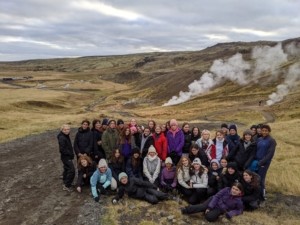Lower School
In the first three years at FHS (III, LIV and UIV), we implement the National Curriculum in terms of geographical skills and develop a sense of place through thematic topics, using case studies and stimulus material in lessons. A variety of teaching and learning methods is used, with an emphasis on the application of thinking skills and ICT to enhance understanding. Along with fieldwork, visits to museums, exhibitions and lectures are also incorporated into the programme of study, where appropriate.
GCSE
The Lower Fifth study the AQA Geography course and the Upper Fifth follow the Cambridge IGCSE specification. Both courses emphasise the relationships between people and the environment. The study of Geography at GCSE encourages the development of a ‘sense of place’; an understanding of the physical and human processes that affect the environment, and an awareness of the opportunities and challenges that people face in different places. A variety of skills are acquired, including interpretation and analysis of a range of geographic evidence such as written reports, newspaper articles, graphs, maps, photographs and data. There is also an emphasis on using and developing Computing skills. Independent learning and the discussion of topical issues are an important part of the course.
A Level
The study of Geography in the Sixth Form equips students with an in-depth knowledge of places, processes and environments. They discover the variety of human and physical environments, how people and place interrelate, and the causes and consequences of environmental change at a variety of scales. Skills such as interpreting information, statistical analysis, independent enquiry, discussion and mapwork are an integral part of the course.
Both the Lower and Upper Sixth follow the OCR A Level syllabus. Post 16 Geography courses equips learners with the skills required to make a success of their subsequent studies at university. This course enables students to learn about people and their societies, economies, cultures and the environment, at a variety of spatial scales.
Geography is a valuable subject to study at Sixth Form level. It is widely considered by Russell Group Universities to be the most popular facilitating subject, which enables students to analyse and evaluate information, presented well-reasoned arguments.










